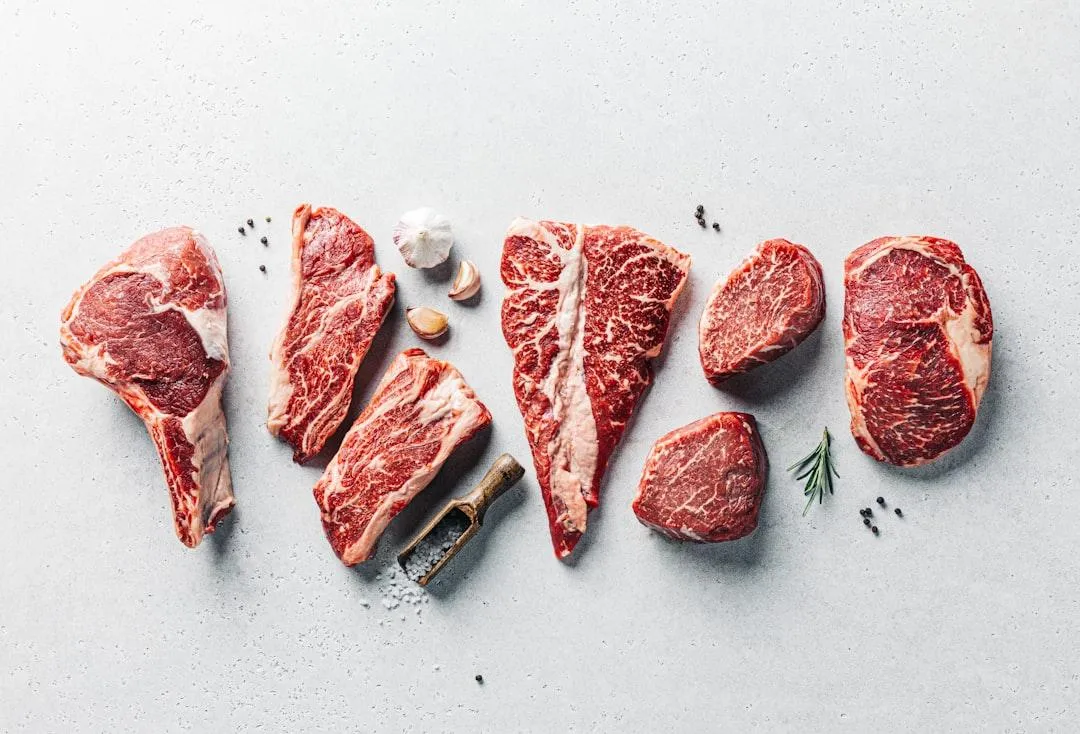
Protein Powerhouses: Your Go-To List for Calorie-Efficient Nutrition
Why Finding the Best Protein Per Calorie is Essential for Your Health Goals
When managing chronic illness or working toward better health, choosing foods with the best protein per calorie can significantly impact your energy, muscle mass, and wellbeing.
Quick Answer: Top Foods with the Best Protein Per Calorie:
Chicken breast - 22g protein per 100 calories
Egg whites - 21g protein per 100 calories
Cod - 20g protein per 100 calories
Shrimp - 19g protein per 100 calories
Greek yogurt (non-fat) - 17g protein per 100 calories
Turkey breast - 21g protein per 100 calories
Halibut - 18g protein per 100 calories
Understanding this ratio helps you get maximum nutrition without excess calories, which is crucial when dealing with inflammation, gut issues, or metabolic challenges.
High-protein foods keep you fuller longer, preserve muscle during weight loss, and boost metabolism. For those frustrated with treatments that only mask symptoms, nutrient-dense proteins are vital for supporting your body's healing.
I'm Dr Andrew Greenland, a functional medicine practitioner at Greenland Medical. I've seen how identifying the best protein per calorie sources can improve energy and support the body's natural healing mechanisms.
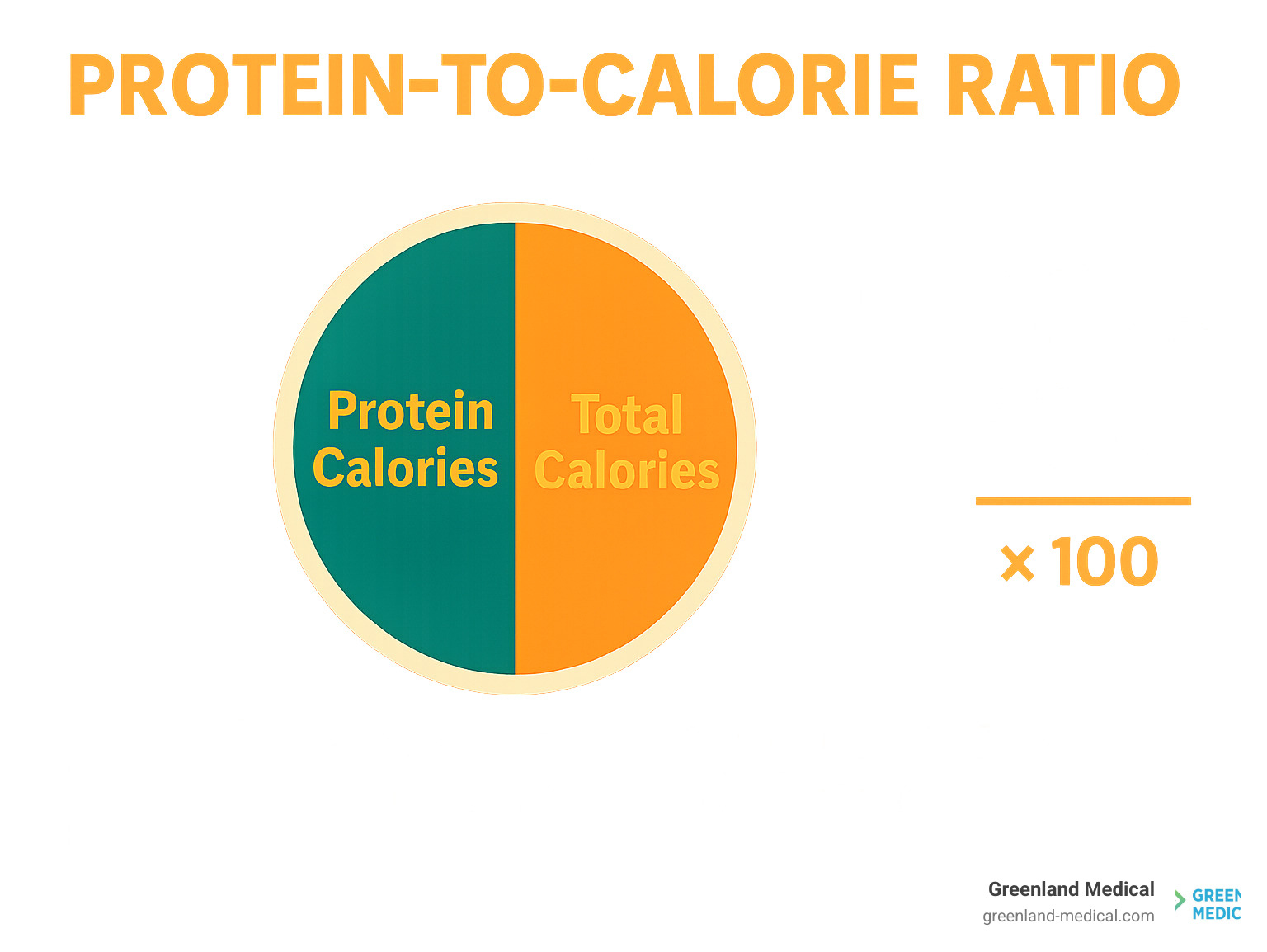
Why the Protein-to-Calorie Ratio is Your Secret Weapon for Fat Loss
Think of your daily nutrition like a budget; you have a limited number of calories to "spend." Foods with the best protein per calorie help you get maximum nutrition without overspending.
Protein is powerful for three reasons:
Higher Thermic Effect: Your body burns more calories digesting protein than fats or carbs. Up to 30% of protein's calories are used in digestion, boosting your metabolism.
Greater Satiety: Protein keeps you feeling full for longer, which is a major advantage when maintaining a calorie deficit for fat loss.
Muscle Preservation: During weight loss, adequate protein prevents your body from breaking down muscle tissue for energy. Since muscle burns calories at rest, preserving it is key to a healthy metabolism.
Scientific research on high protein diets confirms that adequate protein intake leads to better muscle maintenance and long-term weight loss results. This principle is central to our functional medicine approach at Greenland Medical, where we address root causes of weight gain like hormonal imbalances.
Protein also supports hormonal balance. For example, turkey contains tryptophan, an amino acid that helps produce serotonin. This neurotransmitter regulates mood and appetite, helping you feel more satisfied and less prone to emotional eating.
Calculating Your Protein Needs
So how much protein do you need? The general guideline is 0.8 grams per kilogram of body weight for basic health. However, if you're active or trying to lose fat, you'll need more.
For active individuals, aim for 0.7 to 1 gram per pound of body weight. A 150-pound person would target 105-150 grams of protein daily.
A practical trick: Use your height in centimeters as a protein target in grams. If you're 165 cm tall, aim for 165 grams of protein. It's a simple estimate that often falls within the optimal range.
Setting a minimum daily target (e.g., 100 grams) offers flexibility while ensuring you get enough. Consistency is more important than perfection; focus on your overall daily intake.
The Ultimate List of Foods with the Best Protein Per Calorie
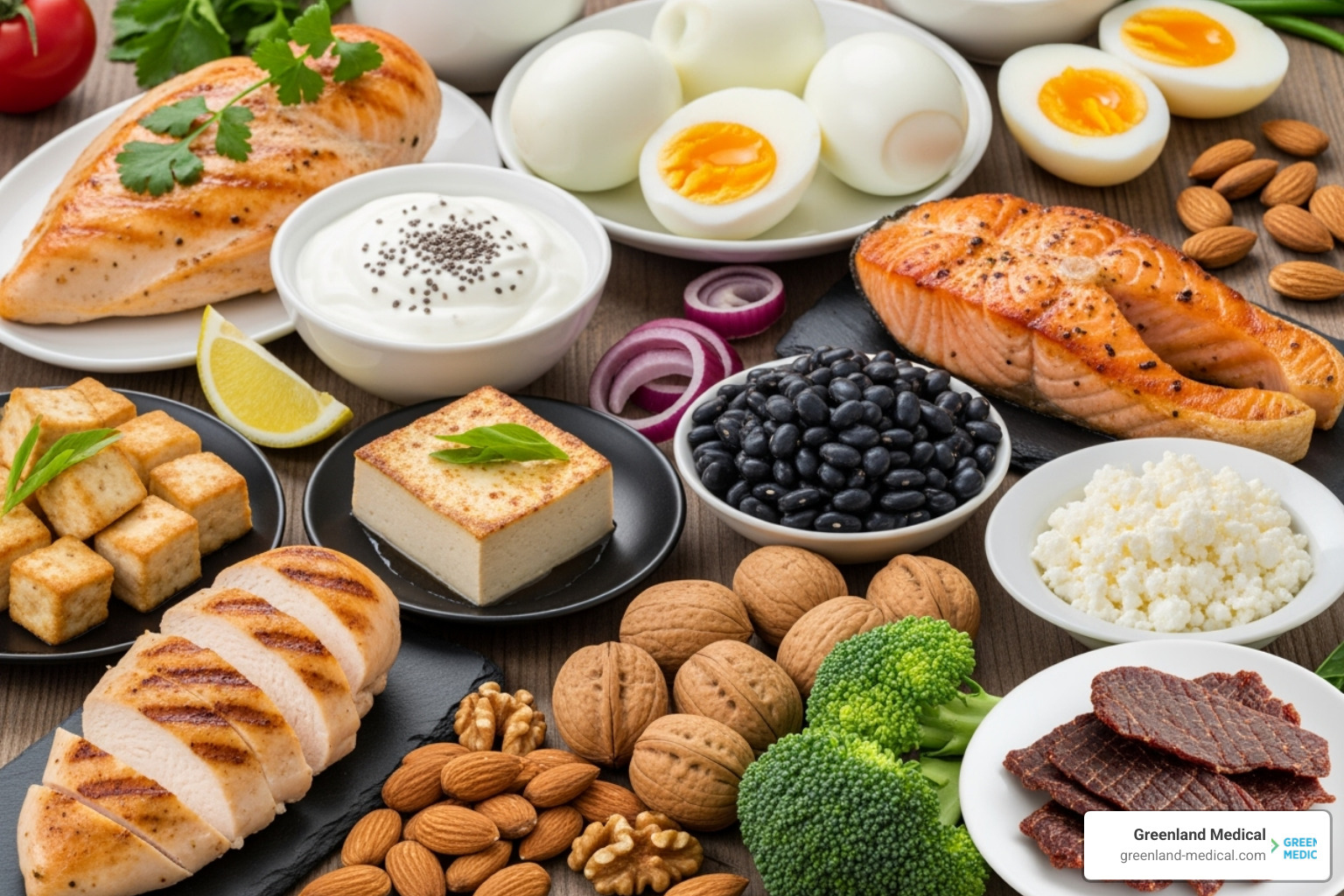
Here are the foods that deliver the best protein per calorie, helping you stay satisfied while managing your calorie intake. These nutrient-dense, lean protein sources will help you hit your goals without breaking your calorie budget.
Seafood Superstars
Seafood consistently ranks among the top choices for high-protein, low-calorie nutrition and often contains beneficial omega-3 fatty acids.
Tuna (Yellowfin): A 3-oz serving has 25g of protein for 110 calories. Its high selenium content helps protect against mercury toxicity. Pregnant women should stick to 2-3 servings per week.
Shrimp: Offers 19g of protein and only 101 calories per 3-oz serving. It contains the antioxidant astaxanthin, which may help reduce inflammation.
Halibut: Provides 19g of protein for just 94 calories in a 3-oz serving. Due to mercury levels, pregnant women should limit intake to one serving per week.
Cod: A lean choice with 16g of protein for only 72 calories per serving. It's rich in B vitamins and heart-healthy omega-3s.
Alaskan Pollock: Offers 20g of protein and 94 calories per 3-oz serving. The FDA considers it a low-mercury choice, safe for 2-3 servings weekly during pregnancy.
Tilapia: Packs 23g of protein into a 111-calorie fillet. It's mild-tasting and versatile.
Dried fish: Highly concentrated, with 18g of protein per ounce. Be mindful of the high sodium content.

Poultry & Lean Meats
These familiar favorites deliver excellent protein without excessive calories or fat.
Skinless chicken breast: The gold standard, with 27g of protein for 140 calories per 3-oz serving. Remove the skin to maximize the protein-to-calorie ratio.
Skinless turkey breast: Equally impressive, offering 26g of protein for just 125 calories.
Egg whites: Virtually pure protein, with 27g of protein for only 126 calories per cup. They are fat-free and versatile.
Lean beef (5% fat): Delivers about 25g of protein per 100g. Choose the leanest cuts to limit saturated fat to no more than 6% of daily calories.
Bison: Offers around 25g of protein per 100g and is typically leaner than beef.
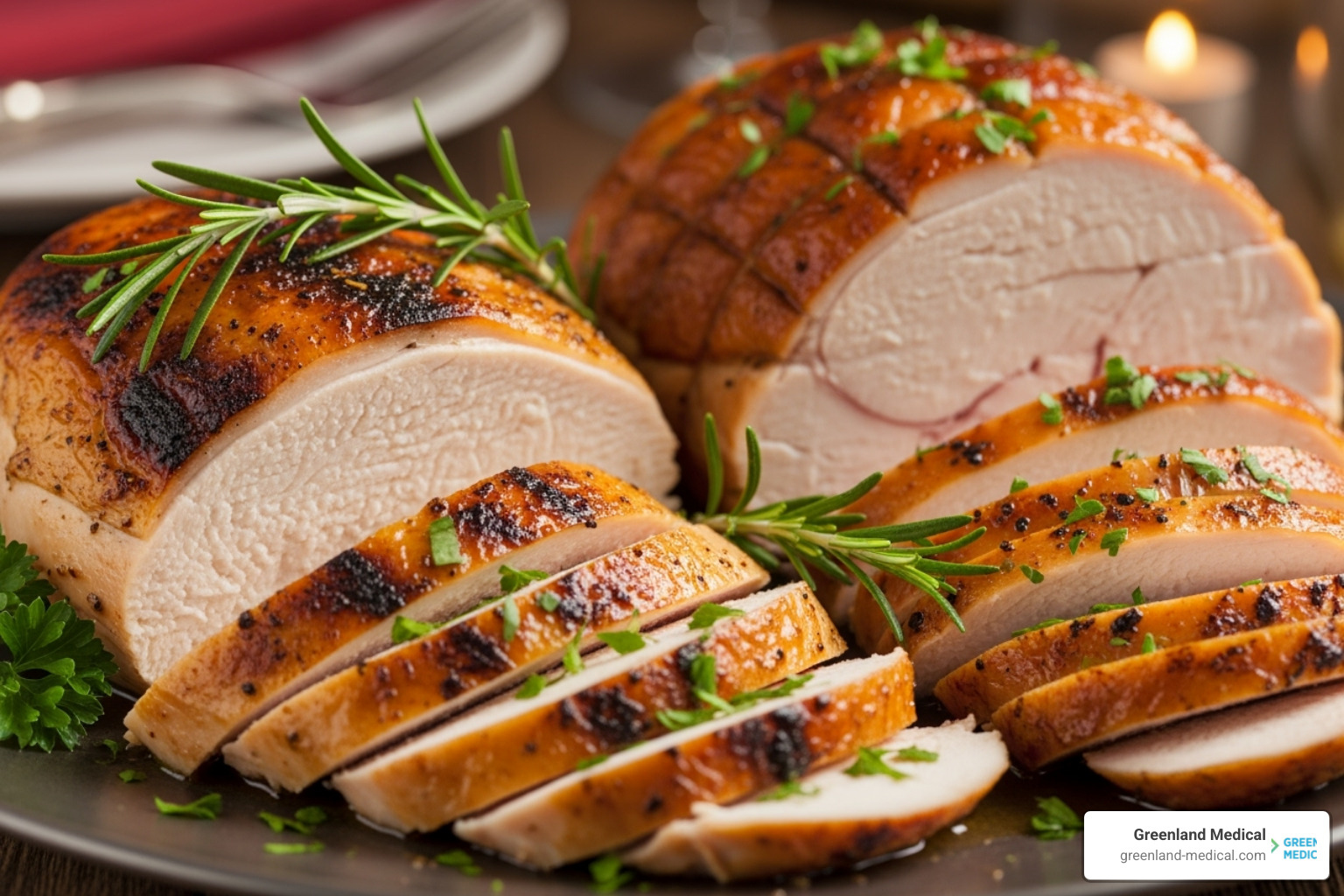
Dairy & Eggs
Dairy and eggs offer high-quality complete proteins containing all essential amino acids.
Plain Greek yogurt (low-fat or non-fat): Provides nearly 10g of protein per 100g, plus beneficial probiotics for gut health. Avoid flavored varieties with added sugars.
Cottage cheese: Offers about 11g of protein per 100g along with calcium.
Whole eggs: Contain approximately 12g of protein per 100g. The yolk provides additional vitamins and healthy fats.
Whey protein powder: Tops the list for pure efficiency. Mix with water for a quick post-workout boost.
Casein protein powder: Digests more slowly than whey, providing a sustained release of amino acids. Ideal before bed.
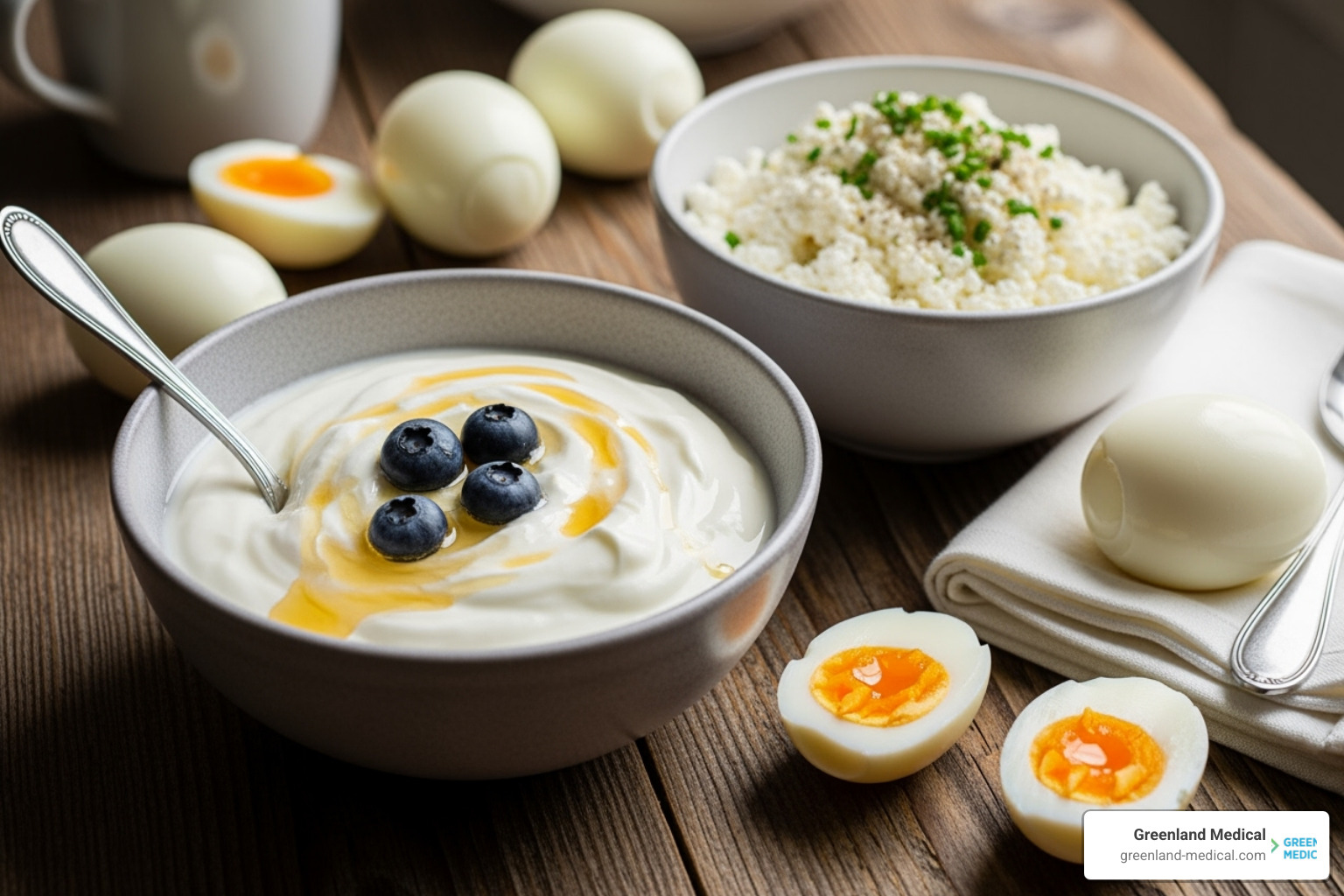
Plant-Based Proteins with the Best Protein Per Calorie
While not always as protein-dense as animal sources, plant-based options offer unique benefits like fiber and antioxidants.
Spirulina: The plant kingdom's champion, with 57g of protein per 100g. This superfood algae blends well into smoothies.
Hemp seeds: Deliver 31g of protein per 100g and provide healthy omega-3 and omega-6 fatty acids.
Tempeh: A fermented soybean product with 20g of protein per 100g, offering all essential amino acids and probiotics.
Chickpeas (dry): Provide around 21g of protein per 100g and are incredibly versatile.
Edamame: Offers about 11g of protein per 100g along with fiber and folate.
Tofu: Contains around 10g of protein per 100g and is a complete protein.
Lentils: Pack about 9g of protein per 100g (cooked) and are loaded with fiber.
Oats: Provide about 13g of protein per 100g along with complex carbs for sustained energy.
Quinoa: A complete plant protein with about 4g of protein per 100g.
Broccoli and cauliflower: Contribute meaningful protein (2.8g and 1.9g per 100g, respectively) while being very low in calories.
At Greenland Medical, we understand dietary preferences and sensitivities. If you struggle with how certain foods affect you, our food intolerance testing can provide insights for a personalized nutrition plan.
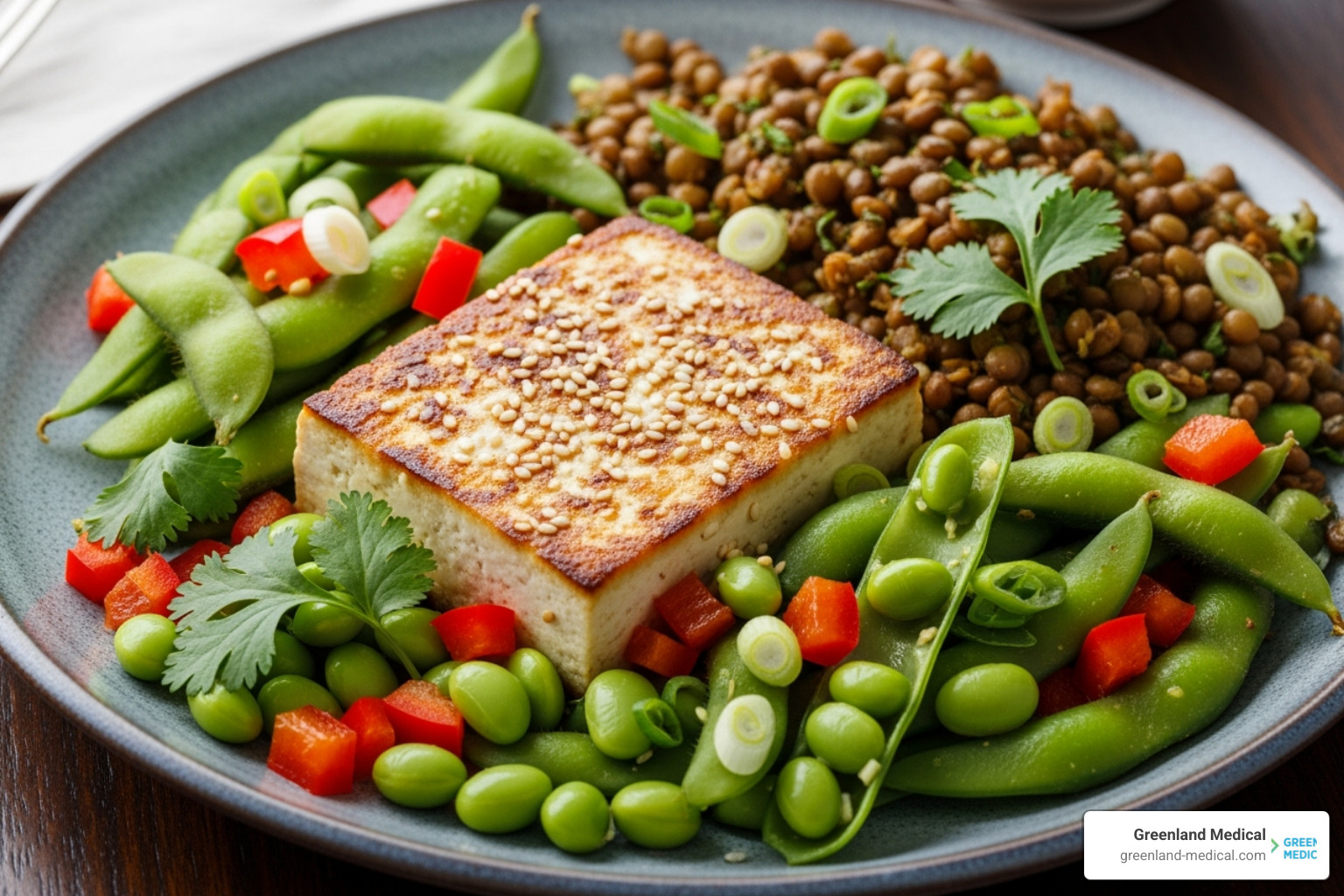
How to Integrate High-Protein, Low-Calorie Foods into Your Life
Knowing which foods offer the best protein per calorie is the first step. The next is making them part of your daily routine. Success lies in practical strategies and meal planning that fit your schedule.
Start by dedicating 20 minutes weekly to plan meals around a few go-to protein sources from our list. This removes guesswork and ensures you hit your targets. Simple swaps also make a big difference: choose Greek yogurt over regular yogurt, or lean ground turkey instead of beef.
Effective Ways to Track Your Protein Intake
Tracking your protein intake can be empowering. Food tracking apps like MyFitnessPal or Cronometer simplify this process, and reading nutrition labels helps you make informed choices at the grocery store.
For a less structured approach, try the "Three Plates, Two Snacks" method:
Half your plate: Vegetables or salad.
One quarter of your plate: A lean protein source from our list.
Remaining quarter: Complex carbohydrates (quinoa, sweet potatoes) or healthy fats (avocado).
Two daily snacks: Protein-rich options like cottage cheese, a hard-boiled egg, or a handful of hemp seeds.
This method naturally guides you toward better protein-to-calorie ratios without obsessive tracking.
Sample Meal Ideas for Maximizing the Best Protein Per Calorie
Here are some simple meal ideas to get you started:
Breakfast: Egg white omelette with spinach; plain Greek yogurt with berries and hemp seeds; a protein smoothie with whey powder.
Lunch: Grilled chicken salad; canned tuna mixed with Greek yogurt in lettuce cups; leftover baked fish with steamed vegetables.
Dinner: Baked cod with roasted asparagus; lean ground turkey stir-fry with vegetables; hearty lentil soup.
Snacks: Hard-boiled eggs; cottage cheese; Skyr yogurt.
To boost your intake, try front-loading protein at breakfast (aim for 30-40g), doubling your usual protein portions, and keeping high-protein snacks readily available. Focusing on leaner sources is especially important when in a calorie deficit to preserve muscle while losing fat.
Frequently Asked Questions About Protein Intake
Let's tackle some common questions about protein intake.
Are protein supplements necessary, or can I get enough from food alone?
Protein supplements are not strictly necessary. Whole foods are always the priority, as they provide a spectrum of nutrients like vitamins, minerals, and fiber that powders lack.
However, protein powders (whey, casein, or plant-based) can be incredibly convenient for hitting your daily targets, especially after a workout or for a quick breakfast. Think of them as a helpful backup, not your primary protein source. If you consistently struggle to meet your goals with food alone, a quality powder can help you get the best protein per calorie without hassle.
What are common misconceptions about protein digestion and maximum intake per meal?
A common myth is that your body can only absorb 30 grams of protein per meal. This is untrue. Your digestive system is highly efficient and can handle larger protein meals, sometimes 80-100 grams or more. The absorption simply happens more slowly over several hours.
While spreading your protein intake throughout the day is a smart strategy for satiety and steady muscle protein synthesis, it's not a rigid rule. Focus on your total daily protein intake rather than obsessing over per-meal limits.
How do protein needs differ for vegetarians and vegans?
This requires a bit more planning. Most animal proteins are "complete," containing all nine essential amino acids. Most plant proteins are "incomplete," but this is easily solved by combining different plant sources throughout the day (e.g., rice and beans, hummus and pita).
Some plant foods are complete proteins, including quinoa, soy (tofu, tempeh), and spirulina. These often have some of the best protein per calorie ratios in the plant kingdom.
Because plant proteins can be less dense and slightly less bioavailable, vegetarians and vegans may benefit from a slightly higher protein target. At Greenland Medical, our functional medicine approach helps plant-based eaters optimize their nutrition by looking at the whole picture, including digestive health.
Conclusion
Focusing on foods with the best protein per calorie is a powerful strategy for weight management, muscle preservation, and overall wellbeing. Protein-dense foods keep you satisfied, protect muscle, and boost your metabolism.
You now have a toolkit of options, from seafood superstars like cod to plant-based champions like tempeh. The key is to find what works for your lifestyle and health needs. Start by making small, sustainable swaps, like choosing Greek yogurt or adding an egg white omelette to your breakfast routine.
Consistency is more important than perfection. At Greenland Medical, our personalized approach recognizes that every individual is unique. We dig deeper to understand your specific health challenges, from gut issues to cognitive concerns, to address root causes.
Prioritizing high-quality protein is a significant step toward supporting your body's natural healing processes. Combined with adequate sleep, movement, and stress management, these nutritional choices form the foundation for lasting health.
